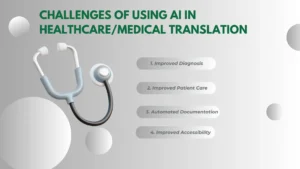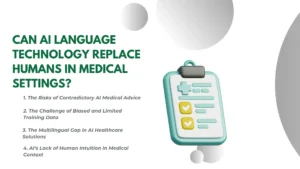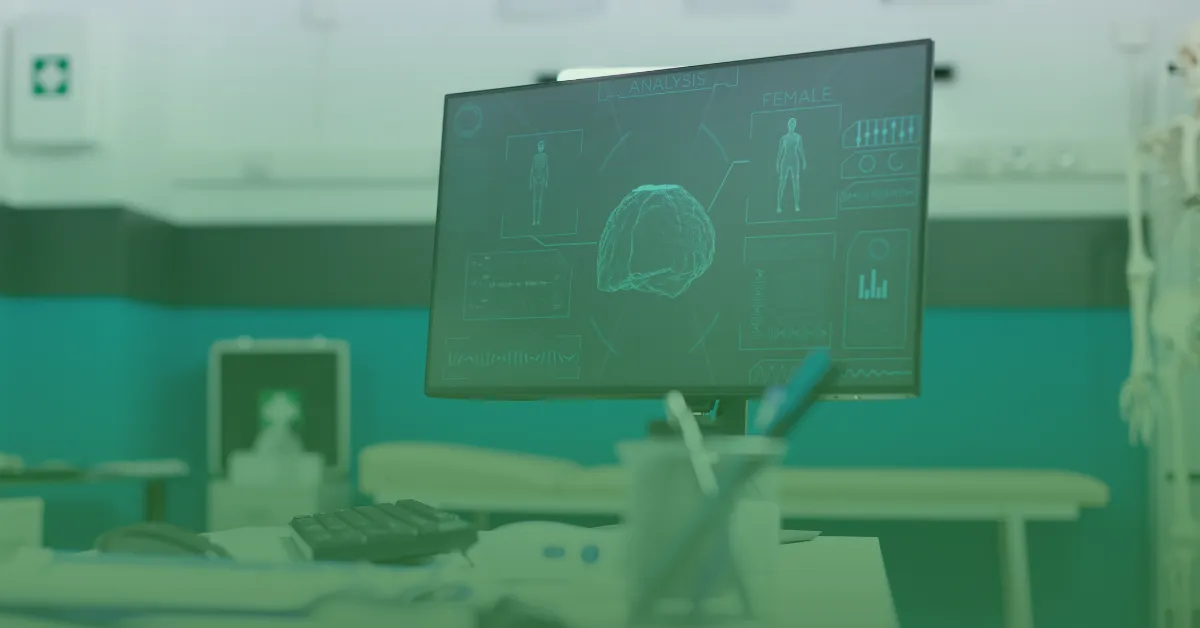AI, Language and Healthcare
 Introduction
Introduction
In recent years, artificial intelligence (AI) has made significant inroads in the healthcare industry.
Healthcare providers are using AI-powered chatbots to communicate with patients, AI-powered diagnostics
to improve patient care, and AI-powered robots to assist in surgery.
Language is a critical component of healthcare. Providers must communicate effectively with patients,
understand medical jargon, and provide clear instructions.
The relationship between AI and language in healthcare is complex. AI can improve communication,
but it can also create new barriers. Benefits include improved care, efficiency, and reduced costs.
Challenges include communication barriers, specialized training, and risks of errors.
Artificial intelligence (AI) is everywhere
Artificial Intelligence is becoming increasingly dominant in daily life—from smartphones and cars to
customer service and even diagnosing medical conditions. AI automates tasks, creates new services,
and makes life easier.
AI in Healthcare
Healthcare is evolving rapidly with AI helping develop treatments, diagnose diseases,
personalize care, and manage patient data. Language plays a central role, especially through
Natural Language Processing (NLP) which enables computers to interpret human communication.
Machine Translation and Healthcare
Machine translation is crucial in healthcare. It translates patient records, medical documents,
and research papers across languages. This improves communication with non-native speakers
and enhances collaboration among global researchers.
However, MT tools must prioritize medical accuracy and support different dialects.
Current systems often lack this nuance, leading to potential misunderstandings.
Speech to Text Software and Healthcare
Speech-to-text technology streamlines transcription of patient conversations and improves accessibility.
However, context and cultural nuances are often missed, which can cause critical misunderstandings
in diagnosis and treatment.
The relationship between AI and Language in Healthcare
AI supports drug development, diagnosis, personalized care, and data management. Language is vital in all these tasks.
NLP allows AI to translate medical information, bridge cultural gaps, and enhance efficiency in healthcare systems.
The benefits of using AI in Healthcare
| Benefit | Description |
|---|---|
| Improved Diagnosis | AI analyzes vast datasets to identify patterns and support accurate diagnoses. |
| Improved Patient Care | AI interprets patient feedback and supports better doctor-patient communication. |
| Automated Documentation | AI streamlines medical records and billing processes, reducing time and errors. |
| Improved Accessibility | AI provides quick access to medical data, improving efficiency for patients and providers. |
Challenges of Using AI in Healthcare/Medical Translation
1. Improved Diagnosis
– AI analyzes large datasets quickly and accurately to aid in diagnosis.
– Uses natural language processing (NLP) to detect patterns in patient data that humans might miss.
– Leads to more precise diagnoses and better patient outcomes.
2. Improved Patient Care
– AI enhances doctor-patient communication through NLP and feedback interpretation.
– Helps tailor treatment plans based on patient history and responses.
– Results in more personalized and effective care.
3. Automated Documentation
– Streamlines medical record-keeping, billing, and administrative tasks.
– Reduces manual errors and saves time for healthcare providers.
– Ensures higher accuracy and compliance in documentation.
4. Improved Accessibility
– Provides fast and easy access to medical information for patients and providers.
– Eliminates the need to manually search through complex databases.
– Supports telemedicine and remote healthcare services.
Can humans be replaced by AI language technology in a medical setting?
 Despite progress, AI still cannot replace human medical professionals or interpreters.
Despite progress, AI still cannot replace human medical professionals or interpreters.
Chatbots may provide inconsistent advice and struggle with underrepresented languages.
More importantly, AI lacks human intuition, empathy, and cultural awareness.
Human interpreters remain irreplaceable due to their specialist knowledge, ability to handle sensitive
situations, and understanding of cultural and emotional nuances in patient care.









